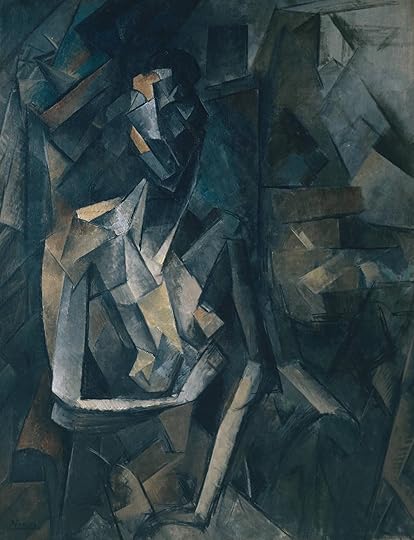Fragmentary Solipsism
 Pablo Picasso, Bust of a Woman, Oil on Canvas, 1909
Pablo Picasso, Bust of a Woman, Oil on Canvas, 1909Fragmentary Solipsism
I have recently read a post arguing that Post-Modernism has alienated readers. Possibly so, and I would wish to point out some of the reasons why. When Alan Bullen describes the Modernist experience as a 'double image', where the divide between the Victorian world and the one left in tatters after the First World War, he was not speaking simply academically, but of a deep malaise that affected Humankind as a whole. True, the Modernists explored fragmentation and its psychological and emotional consequences in their Literature, yet took it as a starting point in the development of the most influential literary movement in Human History. The coming together of three colossal figures such as Joyce, Woolf and Eliot on the literary scene made 1921 the annus mirabilis of Literature, just at the time when Einstein was telling the world that all is relative. Woolf in particular seems to have understood that the 'moments of being' are relative, that consciousness dilates and contracts in time and space, an experience anyone who reads her work will feel quite clearly. Although I do understand how difficult it is to measure up to such gigantic advancements in writing, I also believe that the Modernists did not see themselves as the end of the line, but a new beginning. What they did was embrace new philosophies and new expressive techniques to provide a platform for future Literature. Fragmentation was seen by the Modernists as a condition to explore and conquer, in fact, if we look at how Septimus and Clarissa bridge, even if in the act of dying, separation, at how Tiresias 'sees' when the Sun sets and two worlds come together, and compare it to what Post-Modernism has made of it, we can see that the latter has made of a painful condition a value: not exactly what the Modernists had in mind.
In its unconditional surrender to fragmentation, Post-Modernism has thrown away the baby with the bath water, forgetting that 'these fragments' had been 'shored against [our] ruin,' and had not been presented as reality itself but an experience of reality which we were set to fight against, thus abandoning the battlefield and running away with the weaponry left therewith.
Post-Modernism has fallen into the temptation of exploring and developing the technical consequences of Modernism, but has betrayed its spirit: the way the message is conveyed has become paramount at the expense of the message itself. This has, in my opinion, created a rift between what the reader enjoys and what the writer-now-turned-technician offers: whilst the former is in pursuit of meaning, the latter starts with the assumption that no truth can be arrived to, that the breakdown in our perception of Human experience is ultimate and unbridgeable. The writer appears, to the Post-Modernist reader, as primarily preoccupied with a form of Representationalism which dictates that narrative cannot and should not have unity: the fight against fragmentation has become the search for and justification of it.
The allure of Post-Modernism for the writer is the infinite possibilities that narrative fragmentation implies and engenders: we may have overthrown the tyranny of the omniscient narrator, but have not replaced him/her with a structured republic, yet with a long and self-absorbed discourse on how there can be no authority. Solipsism, possibly the only accountable reality of our condition, reigns supreme in the Post-Modern literary world. Yet, and here one needs a leap of faith, Free Will implies the ability to change our condition, not just taking stock of it. And it is Free Will which Post-Modernism sacrifices on the altar of Representationalism.
The irony is that Representationalism a rather antiquated Aesthetic Theory, and whilst the visual Arts have progressed, Post-Modernism seems incapable of accepting its Representationalist bias: if the focus remains on ways of portraying experience, rather than ways of shaping it, the very argument thus engendered is mote. No better evidence is offered than by the great McEwan himself, who follows the argument of Post-Modernism to its very conclusion, thus, while 'The beginning is simple to mark', the separation of reality into fragments, each running on a parallel yet irreconcilable line, end, like the branches Jed clearly sees in one of the three appendixes of Enduring Love , standing naked against the winter sun in all its loneliness. I do understand why some readers felt frustrated by the use of appendixes in the novel, yet I believe McEwan is making a very important statement: if we assume that all Literature is about is representing fragmentation from different points of view, we forsake the very meaningfulness of narrative and surrender our roles as Artists to assume one of 'appendix writers'. We have been writing footnotes to a theory for far too long. The very consciousness Woolf so beautifully explores has become a dependent factor in an equation dominated by the form of experience and our limitations in reporting it, not experience itself.
What Post-Modernism, I believe, has done is put artistry on a pedestal, and forgotten the metaphysical, whilst I am of the opinion that we should put artistry to the service of Art, and re-establish a link between our physical and metaphysical self. We may wish to keep digging as many ditches as we can think of around our shattered selves, but the only reality we will be reinforcing is that there are infinite possibilities for digging, or decide, and here's the leap of faith I believe we need, that Literature is more than a representation of our condition, it is a way of defining ourselves, of, if I am allowed to use these words, even inventing ourselves.
Published on January 12, 2015 09:06
No comments have been added yet.



